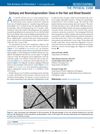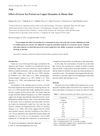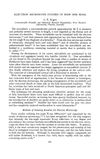19 citations,
July 2004 in “Journal of Medical Primatology” Infant baboons suffered from zinc poisoning due to poor cage conditions.
 2 citations,
October 2018 in “The journal of pediatrics/The Journal of pediatrics”
2 citations,
October 2018 in “The journal of pediatrics/The Journal of pediatrics” The document concludes that specific hair and blood vessel abnormalities in infants with seizures and developmental issues may indicate Menkes disease, which lacks a cure and is often fatal by age 3.
1 citations,
September 2020 in “The Indian journal of veterinary sciences and biotechnology” Mange in camels causes blood and organ damage, especially in older females.
 3 citations,
May 2014 in “InTech eBooks”
3 citations,
May 2014 in “InTech eBooks” Copper deficiency may cause hair loss, and treating it could involve nutrition and hormones.
 January 2013 in “Food science and technology research”
January 2013 in “Food science and technology research” Green tea extract may increase copper levels in mouse hair without affecting liver copper.
 16 citations,
January 2012 in “Asian pacific Journal of Tropical Biomedicine”
16 citations,
January 2012 in “Asian pacific Journal of Tropical Biomedicine” The herbal cream was found to be a safe and effective alternative for hair growth, similar to minoxidil.
 13 citations,
December 2017 in “BMC Complementary and Alternative Medicine”
13 citations,
December 2017 in “BMC Complementary and Alternative Medicine” The Asian herbal mix with Houttuynia cordata, Perilla frutescens, and green tea helped grow hair in mice.
 10 citations,
December 2019 in “in Vivo”
10 citations,
December 2019 in “in Vivo” Testosterone makes the connections in the uterus lining simpler and lowers certain protein levels, which might lead to infertility.
 6 citations,
May 2020 in “Pharmacology Research & Perspectives”
6 citations,
May 2020 in “Pharmacology Research & Perspectives” A new gel form of minoxidil is equally effective for hair growth and safer for the heart and other organs than the traditional solution.
 21 citations,
January 2014 in “Dermatology Research and Practice”
21 citations,
January 2014 in “Dermatology Research and Practice” Hair and serum levels of zinc, copper, and iron are similar in people with alopecia areata and healthy individuals.
 18 citations,
December 2010 in “Journal of Trace Elements in Medicine and Biology”
18 citations,
December 2010 in “Journal of Trace Elements in Medicine and Biology” Women with AGA have more androstenedione and dihydrotestosterone, less copper and zinc; copper imbalance affects AGA; treatment improves hormones and minerals.
 16 citations,
October 2015 in “Photochemistry and photobiology”
16 citations,
October 2015 in “Photochemistry and photobiology” Reducing copper (II) ion levels in hair can decrease hair damage.
 3 citations,
November 2020 in “Biological Trace Element Research”
3 citations,
November 2020 in “Biological Trace Element Research” Men with hair loss may lack zinc, copper, and vitamin D; supplements could help.
 March 2024 in “BMC women's health”
March 2024 in “BMC women's health” The levonorgestrel implant increases free testosterone and lowers SHBG more than DMPA-IM and the copper IUD.
 November 2023 in “Biology”
November 2023 in “Biology” Lower hair copper and copper-to-zinc ratio are linked to more severe coronary artery disease.
 March 2024 in “International journal of molecular sciences”
March 2024 in “International journal of molecular sciences” Zinc, copper, and iron are important for skin health and may help diagnose skin diseases.
 1 citations,
February 2022 in “Biological Trace Element Research”
1 citations,
February 2022 in “Biological Trace Element Research” The combination of Arginine Silicate Inositol Complex and a new form of Biotin improved hair and nail growth in rats.
 191 citations,
November 1959 in “Annals of the New York Academy of Sciences”
191 citations,
November 1959 in “Annals of the New York Academy of Sciences” Hair and wool have complex microscopic structures with microfibrils and varying cystine content.
 93 citations,
November 2018 in “Carbohydrate Polymers”
93 citations,
November 2018 in “Carbohydrate Polymers” New nanocomposites with copper show promise for healing burn wounds and regenerating skin.
 90 citations,
January 1979 in “International review of cytology”
90 citations,
January 1979 in “International review of cytology” Wool follicles are complex, involving interactions between different cell types and structures.
 1 citations,
February 2017 in “MOJ bioequivalence & bioavailability”
1 citations,
February 2017 in “MOJ bioequivalence & bioavailability” Treating hair loss effectively may require a multi-sided approach, using different treatments together, and topical treatments could be more effective and safer than oral ones.
 November 2024 in “Journal of Clinical Medicine”
November 2024 in “Journal of Clinical Medicine” The treatment improved hair thickness, shine, and reduced hair loss effectively.

Penicillamine can cause taste problems due to copper loss, which can be fixed with copper or zinc supplements.
 January 1989 in “Clinical and Experimental Dermatology”
January 1989 in “Clinical and Experimental Dermatology” The symposium concluded that hair growth involves complex processes, including the hair follicle life cycle, the role of the dermal papilla, hair strength, pigmentation, and the impact of diseases and treatments like minoxidil on hair and skin.
 14 citations,
July 2017 in “Monatshefte für Chemie - Chemical Monthly”
14 citations,
July 2017 in “Monatshefte für Chemie - Chemical Monthly” Analytical chemistry helps understand the makeup and use of ancient medicines, but it's complex and challenging.
 305 citations,
July 2016 in “International Journal of Biological Macromolecules”
305 citations,
July 2016 in “International Journal of Biological Macromolecules” Polysaccharides have many health benefits and are used in drugs, but isolating and purifying them is complex and requires careful methods.
 114 citations,
October 2009 in “Gastroenterology”
114 citations,
October 2009 in “Gastroenterology” Zinc is crucial for nutrition, especially in patients with specific health conditions, and requires careful supplementation and monitoring.
 63 citations,
May 2017 in “American Journal of Clinical Dermatology”
63 citations,
May 2017 in “American Journal of Clinical Dermatology” People with alopecia areata often have lower levels of vitamin D, zinc, and folate, but more research is needed to understand if supplements can help treat it.
 15 citations,
January 2016 in “Przeglad Menopauzalny”
15 citations,
January 2016 in “Przeglad Menopauzalny” Eating a balanced diet with specific nutrients is important for menopausal women to manage hair loss.
 2 citations,
November 2023 in “Bioactive materials”
2 citations,
November 2023 in “Bioactive materials” New method improves copper peptide delivery for hair growth three times better than current options.



























